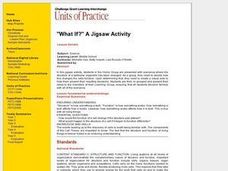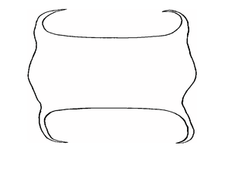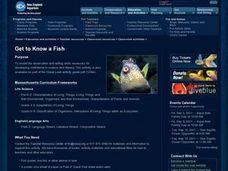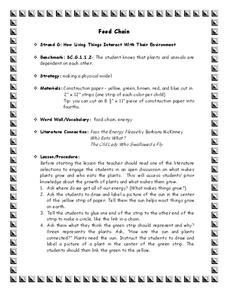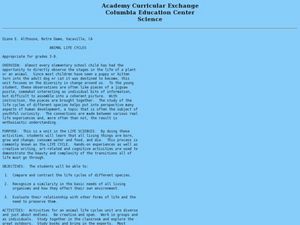Curated OER
What is An Insect?
Students investigate the concept of an insect. They conduct research about six different insects and identify the different body parts. Students look at the life cycle of the developing monarch butterfly. They also use the library to...
Curated OER
"What If?" A Jigsaw Activity
Students, in groups, consider a scenario in which some structure of a cell has been changed. They explore how structural change affects the function of a cell and create a visual aid to illustrate their observations.
Curated OER
Living in Extreme Environments
High schoolers examine the characteristics of the ocean floor and the importance of of extreme environments. In this investigative instructional activity students use four methods to sample populations, gather, record and analyze data...
Curated OER
What Makes A Community Sustainable
In this environment activity, students read three different case studies in order to apply them to the categories of finding the best possible choices to make for helping a community flourish.
Curated OER
What Role Do Forest Play in Continuing or Renewing Our Planet's Resources?
Students explore the interaction between the forest and wildlife. In this forestry lesson, students collect data about forest ecosystems, species of trees, photosynthesis, and interaction of organisms. They prepare a lab activity to...
Curated OER
What Beautiful Caterpillars!
Second graders investigate the life cycle of the caterpillar. They create a caterpillar habitat and care for it. Students make daily observations that are recorded in a writing journal. During the process of observation the students...
Curated OER
What Can a Leaf Be?
Students identify leaves for an art project and create a collage. In this leaf lesson, students review leaf characteristics. Students use leaves to create a collage of an animal or creature. Students write recipes of leaves for their...
Curated OER
Summer Scientists
In this lesson, learners discuss and reocrd what makes an object living or nonliving. The students then chart the lists of living and nonliving objects. Teacher allows learners oportunity to go outside and look for living and ninliving...
Curated OER
Skates
Students gain understanding of structure, characteristics, and basic needs of living things and their role in world, identify parts of skate, observe details of skate's body and skate egg case, and identify unique characteristics of skates.
Curated OER
Get to Know a Fish
Students discover the anatomy of a fish by identifying its body parts. In this oceanography lesson, students view a live fish in their classroom and draw a poster of the fish one body part at a time while identifying it. Students...
Curated OER
Food Webs
Students identify predator/prey relationships based on the food web of the tropical rain forest ecosystem and realize they need a food web for survival. In this food web lesson plan, students complete a role play activity being animals...
Curated OER
Where in the World? Biomes of the Earth
Learners research a biome. In this biomes of the Earth lesson, students discuss what they already know about ecology and view pictures of different biomes. Learners work in groups to research a different biome. Students use the...
Curated OER
Exercise and Water
Second graders discover the needs of their body by trying different types of aerobic exercise. In this physical education lesson plan, 2nd graders analyze The Busy Body Book by glancing at the pictures inside and predicting what the...
Curated OER
Understanding How Potatoes Grow
Second graders make a KWL chart and brainstorm what they need for the project of growing potatoes. They choose one potato and plant it in water or peat moss cups and choose a location in which meets the needs of the plants and make their...
Curated OER
Dinosaurs 1: Where Are the Dinosaurs?
Learners explore the time of the dinosaurs. In this extinction lesson plan, students watch a video clip about different dinosaurs and are asked about what they observed. Learners talk about how dinosaurs hatched from eggs and compare...
Curated OER
Animal Names
Students match animal pictures with animal words. In this farm animal lesson, students put together the parent and their offspring. Students should have prior knowledge of the basic needs of animals. Students write animal booklets.
Curated OER
Dr. Seuss For a Day
Second graders brainstorm words to describe Thing One and Thing Two characters from Dr. Seuss computer program, use variety of adjectives to create descriptions, and create new set of characters, Thing Three and Thing Four, by drawing...
Curated OER
Shedding Light on Watersheds
Students discuss what a watershed is, complete online activities showing them how to take care of a watershed, and create a model of a watershed that they experiment with to see what happens when it is disrupted by civilization.
Curated OER
How Long Until Dirt
Third graders examine the difference between composting and wasting food. They problem-solve what to do about leftovers after lunches so good food doesn't go to waste.They study food storage techniques that are environmentally friendly...
Curated OER
Food Chain
Students discuss what makes plants grow and who eats the plants. They are asked where do we get all of our energy? Students are asked to draw and label a picture of the sun in the center of the yellow strip of paper. They are explained...
Nemours KidsHealth
Germs: Grades K-2
Students demonstrate knowledge about germs. For this health lesson, students investigate what germs are, how to protect the skin by comparing the skin to apple skins, and the proper hand washing technique for getting rid of germs....
Curated OER
Sibling Relationships in the Animal World
Young scholars research sibling relationships in the animal world. In this animal science lesson plan, students read the book, Sisters and Brothers: Sibling Relationships in the Animal World and discuss the sibling relationships. Young...
Curated OER
Animal Life Cycle
Students conduct hands-on experiments. In this life cycle instructional activity, students are able to observe a variety of animals as they travel through their life cycle (brine shrimp, mealworms, frog eggs and chicken eggs). Students...
Curated OER
Once Upon A Bear
Students study different types of bears, their characteristics, and habitats. They discuss what they know and what they want to learn before visiting a website to look at images and information about bears. They listen to teacher read...



